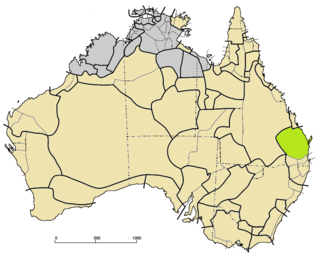See also
- Waka (disambiguation)
- Wagga Wagga, a city in New South Wales
- "Wocka Wocka!", catchphrase of the Muppet Fozzie Bear
- Onomatopoeia of Pac-Man eating
"Waka Waka (This Time for Africa)" is a 2010 song by Shakira and the official song of the 2010 World Cup.
Waka Waka, Wakka Wakka or variants thereof may also refer to:
The Wiradjuri people are a group of Aboriginal Australian people from central New South Wales, united by common descent through kinship and shared traditions. They survived as skilled hunter-fisher-gatherers, in family groups or clans, and many still use knowledge of hunting and gathering techniques as part of their customary life.
Waka may refer to:
WACA may refer to:
Wakka may refer to:
The Goreng Goreng, also known Kooreng Gooreng, are an inland Freshwater Australian Aboriginal people of Queensland, and also a language group. The Goreng Goreng area is between Central West Queensland in the north around Boyne Valley, extending westerly as far as the Great Dividing Range along the Dawes, Auburn, Nogo and Callide Ranges to meet the Wulli Wulli and Ghunghulu to their immediate west over the Great Dividing Range.
Murri is a demonym for Aboriginal Australians of modern-day Queensland and north-western New South Wales. For some people and organisations, the use of Indigenous language regional terms is an expression of pride in their heritage. The term includes many ethno-linguistic groups within the area, such as the Kamilaroi (Gamilaraay) and Yuggera (Jagera) peoples.

Eidsvold is a rural town and locality in the North Burnett Region, Queensland, Australia. The town is the self-proclaimed Beef Capital of the Burnett and is a hub for the regional cattle industry. In the 2016 census, the locality of Eidsvold had a population of 574 people.

Wiradjuri is a Pama–Nyungan language of the Wiradhuric subgroup. It is the traditional language of the Wiradjuri people of Australia. A revival is underway, with the language being taught in schools. Wiraiari and Jeithi may have been dialects.

Ban Ban Springs is a locality in the North Burnett Region, Queensland, Australia. In the 2016 census, Ban Ban Springs had a population of 7 people.

Cherbourg, formerly known as Barambah, Barambah Aboriginal Settlement and Cherbourg Aboriginal Settlement, is a rural town and locality in the Aboriginal Shire of Cherbourg, Queensland, Australia.
The Aboriginal Shire of Cherbourg is a local government area in Wide Bay–Burnett, Australia. In June 2018, it had an estimated population of 1,315.

"Waka Waka (This Time for Africa)" is a song by Colombian singer Shakira, featuring the South African band Freshlyground. Co-written by Shakira and John Hill, it was released on 7 May 2010 by Epic Records as the official song of the 2010 FIFA World Cup, which was held in South Africa. Released in English and Spanish (with the title "Waka Waka (Esto es África)"), the song samples the original Cameroonian makossa song "Zamina mina (Zangaléwa)" by Golden Sounds and the lyrics encourage one to aim for their goals like a soldier on a battlefield.

Wide Bay–Burnett is a region of the Australian state of Queensland, located between 170–400 km (110–250 mi) north of the state capital, Brisbane. The area's population growth has exceeded the state average over the past 20 years, and it is forecast to grow to more than 430,000 by 2031. It is the subject of the Draft Wide Bay–Burnett Regional Plan, which aims to facilitate this growth while protecting over 90% of the region from urban development.

The Waka–Kabic (Waka-Gabi) languages form a nearly extinct family of Pama–Nyungan languages of Australia.
Turvey may refer to:
Wacka may refer to:

The Wakka Wakka language, also spelt Waga, or Wakawaka, is an extinct Pama–Nyungan language formerly spoken by the Wakka Wakka people, an Aboriginal Australian nation near Brisbane, Australia.
Wuliwuli is an extinct Australian Aboriginal language of the Pama–Nyungan language family formerly spoken by the Wulli Wulli people in Queensland, Australia. The Wulli Wulli language region includes the landscape within the local government boundaries of the North Burnett Regional Council, particularly the town of Eidsvold and the Auburn River catchment, including the properties of Walloon, Camboon, and Hawkwood. Wuliwuli is regarded as a dialect of Wakka Wakka.

Barunggam (Murrumningama) is an extinct Aboriginal language spoken by the Barunggam people of Queensland in Australia. The Barunggam language shared many words with the neighboring languages, including Jarowair to the east, Wakka Wakka to the north and Mandandanji to the west. Kite and Wurm describe Barunggam as a dialect of Wakka Wakka.
Wakka Wakka, or Waka Waka, people are an Aboriginal Australian people of the state of Queensland.